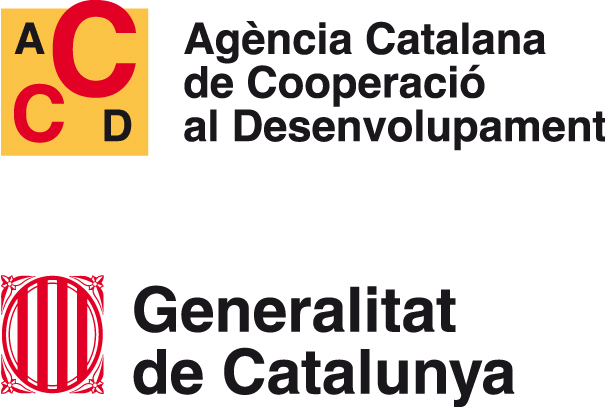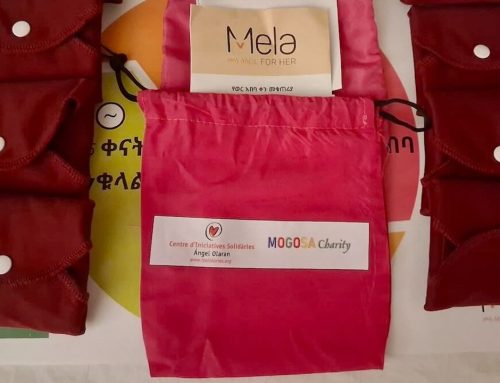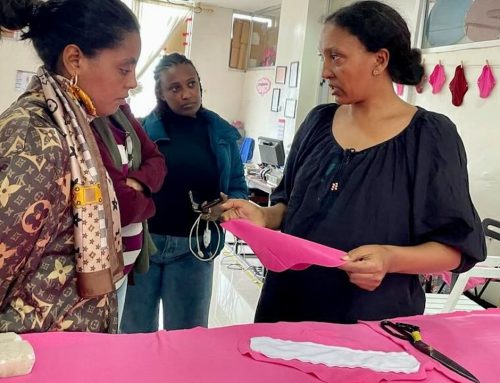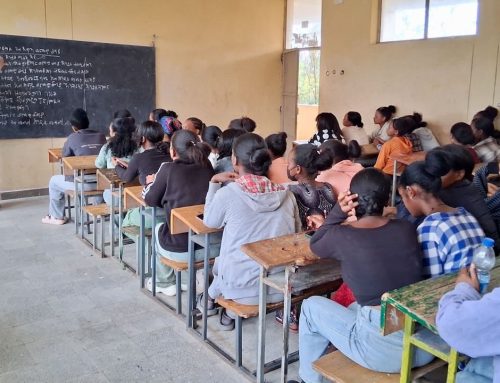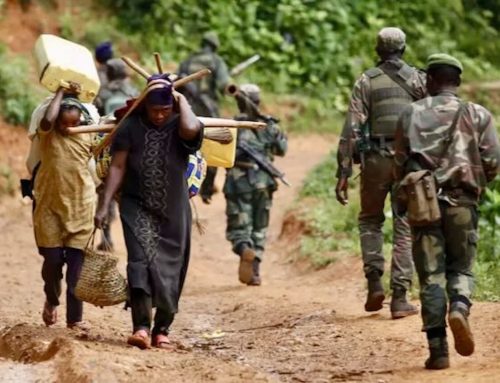💜 Menstrual Hygiene Day: Dignity and Hope for the Girls and Women of Wukro
On May 28, we celebrate Menstrual Hygiene Day: Dignity and hope for the girls and women of Wukro. This international awareness day seeks to break the silence and taboos surrounding menstruation and to defend the right of all girls, adolescents, and women to manage their menstrual cycle in a safe, healthy, and dignified way. Unfortunately, the current reality shows that we are still far from achieving this goal: it is estimated that around 500 million women and girls worldwide do not have access to menstrual products or adequate hygiene facilities. Behind this staggering number lie millions of stories of frustration, helplessness, and lost opportunities.
Image of a classroom at Negash School during the distribution of dignity kits as part of the empowerment project for girls, adolescents and women in Wukro, Tigray (Ethiopia).
🌍 Menstrual poverty: a global and silent challenge
We talk about menstrual poverty when a person is unable to access the basic resources needed to manage their menstruation. This poverty is not confined to faraway countries; it is a global problem found both in under-resourced regions and in wealthier environments. In essence, menstrual poverty involves multiple shortcomings and obstacles, such as:
- Lack of affordable hygiene products: pads, tampons, or other safe options are often unaffordable or inaccessible.
- Inadequate sanitation infrastructure: the absence of clean toilets, running water, or private spaces to change, especially in schools and rural communities.
- Misinformation and taboos: the lack of education about menstrual health fuels myths and shame, leaving many girls to grow up without understanding what is happening to their bodies.
- Social stigma: in many cultures, menstruation is taboo, leading to discrimination, isolation of girls during their period, and even harmful practices.
📚 Menstrual hygiene training session at a school: learning together helps break the taboo. When menstruation is experienced under precarious conditions, the consequences are devastating. The numbers speak for themselves: in Sub-Saharan Africa and other regions, millions of girls miss school during their period due to fear of staining their clothes or simply because they lack sanitary pads. In Ethiopia, for example, less than a third of women have everything they need to manage their periods properly—only 28% have full access. The majority are forced to improvise unsafe solutions or stay home during menstruation. In addition, the available disposable products are often expensive and polluting; a single disposable pad can contain up to 90% plastic and take 500–800 years to decompose. Over her lifetime, a woman can generate up to 200 kg of waste in pads and tampons—an environmental burden added to the emotional weight.
The main barriers faced by young women in developing countries to live their menstruation with dignity are precisely the lack of access to affordable products, the low availability of supplies, and the lack of menstrual health education. On top of these material difficulties, stigmatization and cultural taboos weigh heavily. In many communities, menstruation is considered shameful and unspoken: a menstruating girl is deemed impure or is excluded from daily activities. This hostile environment makes girls experience their cycle with anxiety and low self-esteem, convinced it is something shameful and unmentionable.
🎒 Impact on the lives of girls and adolescents: education, health, and opportunities
Quan la menstruació es converteix en un obstacle, tota la vida de la nena o dona se’n ressent. Què passa quan una adolescent no té compreses? Doncs que sovint es veu obligada a faltar a l’escola. Diversos estudis estimen que entre un 19% i un 68% de les alumnes a Etiòpia es queden a casa durant la menstruació. Imagina’t el cost d’això: dies perduts de classes, matèries que queden endarrerides… Algunes, encara que hi vagin, passen l’estona patint per si es taquen l’uniforme o si algú ho nota, cosa que les impedeix concentrar-se. 📚 Les absències reiterades acaben minvant el rendiment escolar i, massa sovint, desemboquen en abandó. Quan una noia deixa els estudis abans d’hora, el seu futur es torna molt més incert: augmenta el risc de matrimonis forçats o precoços i de embarassos adolescents, tallant de soca-rel les seves oportunitats de desenvolupament.
When menstruation becomes an obstacle, the entire life of a girl or woman is affected. What happens when a teenage girl has no access to sanitary pads? Often, she is forced to miss school. Several studies estimate that between 19% and 68% of schoolgirls in Ethiopia stay home during their period. Imagine the cost of that: missed school days, falling behind in subjects… Some girls, even when they attend, spend the day worrying about staining their uniform or someone noticing, which prevents them from concentrating. 📚 Repeated absences undermine school performance and often lead to dropping out. When a girl leaves school early, her future becomes far more uncertain: the risk of early or forced marriageand teen pregnancy increases dramatically, cutting off her opportunities for development.
But it’s not only about education. Poor menstrual hygiene management can lead to health problems (such as infections due to inadequate hygiene), impact mental health (due to constant stress and shame), and perpetuate gender inequality. It’s a silent injustice that robs millions of young people around the world of their dreams and potential.
In the case of Wukro, a city in the Tigray region of northern Ethiopia, these challenges have been worsened by extreme circumstances. In recent years, a devastating armed conflict has struck the region, affecting more than 20 million people and destroying around 2,500 schools, with an estimated 1.5 million children left out of the education system. Many of these girls had already been out of school for too long: first due to the COVID-19 pandemic, and then because of the war… Now, returning to normality is a monumental challenge, and barriers like menstrual poverty make the road to a better future even harder.
✨ Empowerment in Wukro: a project that transforms lives
Faced with this reality, the CIS Ángel Olaran Foundation—faithful to its commitment to the people of Wukro—has launched a project: Empowerment of girls, adolescents, and women in Wukro, Tigray (Ethiopia). The goal is clear: no girl in Wukro should be left behind because of menstruation. Specifically, the project aims to ensure that vulnerable girls in Tigray can attend school while improving their quality of life and self-esteem, reinforcing their role in society. To achieve this, several complementary lines of action have been implemented:
- Training local trainers: Teachers, nurses, and community leaders are trained in menstrual health and hygiene so they themselves become educators and role models for the young women in the area. This ensures that knowledge is multiplied and preserved within the community.
- Distribution of dignity kits: 1,000 menstrual kits are being distributed to secondary school girls and women in vulnerable situations in Wukro. Each kit includes reusable cloth pads (high-quality MELA model) and appropriate underwear—sustainable materials that can last for years. These kits provide a safe and environmentally friendly solution, freeing girls from the financial burden of monthly purchases and reducing plastic waste.
- Menstrual health and self-esteem education: In addition to delivering the materials, workshops are held with the beneficiaries to teach them how to use and properly clean the reusable pads, better understand their bodies, and debunk myths about menstruation. In these safe spaces, girls learn that their period is neither dirty nor shameful, and they build confidence and life skills to face future challenges.
- Community awareness and fighting taboos: The project seeks to identify and eradicate sociocultural barriers associated with menstruation that fuel gender inequality. This involves school and community talks that include boys, parents, and local leaders, so everyone becomes part of the solution. When the community understands that menstruation is a natural process and breaks the silence, it creates a supportive environment where girls can manage their periods without fear or stigma.
This comprehensive project is changing lives in Wukro. Imagine a girl who once felt alone, scared, and limited by her period: now you’ll see her actively participating in class, with her kit, confident and no longer forced to give up on her dreams. Each dignity kit delivered is much more than a set of hygiene materials: it’s a passport to equality. It means school days recovered, smiles returned, and futures reclaimed. As local staff remind us, when you give a young woman the tools to manage menstruation with dignity, you are also giving her confidence, health, and power to make choices about her life.
It is important to highlight that this project is carried out on the ground with the support of local organizations. The foundation works directly with Mogosa Charity (a grassroots Ethiopian NGO) and the Mela for Her team (an Ethiopian social enterprise specializing in sustainable menstrual products) to implement the activities. In addition, it has the support and coordination of the regional departments of education, health, and women, as well as local schools. This local involvement ensures that the project is sustainable and culturally adapted to the reality in Wukro, making use of local resources and strengthening the local economy (including the production of reusable pads in the country).
With a relatively modest budget—about €15,000 in total—this initiative aims to change the lives of 1,000 girls and women. In other words, for just €15 per person, a young woman is provided with everything she needs to manage her menstruation with dignity for years. It’s a small investment for a huge impact. And the results are not only measured in numbers, but in hopeful looks and stories of resilience: girls dreaming again of becoming teachers, doctors, or whatever they wish—because nothing will force them to stay home anymore.
🌟 Join the Movement: Your Action Matters 👐
On this Menstrual Hygiene Day, we invite you to reflect and, above all, to take action. Menstrual poverty is an injustice that we can—and must—fight together. At the CIS Ángel Olaran Foundation, we work every day to ensure that no girl has to give up her education or health due to the lack of something as basic as a menstrual pad. But we need your help to go further.
🎁 Make a donation today and help us distribute more dignity kits in Wukro. Every contribution, no matter how small, is a step forward: with just €15, you can change a girl’s life by equipping her with the tools and education she needs to face the future with confidence. You can make your donation quickly and securely by accessing the project’s web link or contacting us directly.
🤝 Spread the word among your community. Talk about menstruation without taboos, educate, listen, and empathize. If we can break the silence here, we’re helping to break it everywhere.
🙏 Commit to change. You can join the project as a volunteer, share information, or simply stay updated on our initiatives in Wukro, Tigray. Every form of support counts—and every step brings us closer to a world where menstruation is never again a reason for discrimination.
On May 28, we celebrate Menstrual Hygiene Day, join our call. Let’s celebrate Menstrual Hygiene Day by making it a true day of change. With your support, we will continue to deliver dignity, health, and hope to those who need it most.
Thank you for being part of the solution! 💜
With the collaboration of
